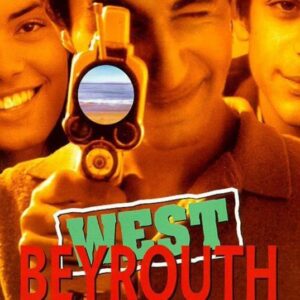Tarek Noueiri (Rami Doueiri) steps outside the classroom and unfastens the casement window. His French teacher’s words reverberate across the hallway: “Let us not forget that France created your country.” She continues pompously: “and gave you your borders, and taught you about peace.” The 15-year-old Lebanese schoolboy’s earlier mischiefs, singing the Lebanese national anthem through a megaphone as students recited Marseillaise, provoked the teacher’s fiery rant on French exceptionalism. Now ousted from the classroom, Tarek glares out the open window, a sly grin painted on his face. His visible indifference, however, abruptly fades away. In the street below, five gunmen with faces concealed with black and red ski masks stealthily prepare for an attack. Through the window, Tarek witnesses as they fired gunshots at a bus carrying Palestinians, ruthlessly murdering several inside the vehicle. “West Beirut” illustrates the violence that struck Beirut following this brutal attack through the eyes of three naive and innocent teens, offering a playful lens to an otherwise grave event in Lebanese history.
In his film “West Beirut,” Lebanese film director Ziad Doueiri transports viewers to the 1970s during the early moments of the Lebanese Civil War. He follows Tarek and his partner-in-crime, Omar (Mohammed Chamas), as they wreak havoc across Beirut and record foolish videos on Omar’s Super 8 camera. Doueiri frequently displays the pair’s film shots, switching to grainy black-and-white video recordings against an unmoving image noise. May (Rola Al Amin), a Christain refugee, eventually joins the duo, and Tarek falls smitten with her. However, as military checkpoints infiltrate the city and deepen the sectarian divide, the trio’s fate is challenged.
The civil war threatened the routine normalcy of life, coercing schools into indefinite closures and welcoming distress to harmonious neighborhoods. While Tarek, Omar, and May remain dedicated to their frivolous affairs, the conflict gradually hinders their efforts and commitments. An attempt to develop their Super 8 movies entails a perilous journey across the West-East Beirut border. May’s unapologetic display of a crucifix around her neck jeopardizes the trio’s endeavors. Omar’s Muslim father embraces fundamentalist values, denouncing his fondness for cinema, theater, and rock ‘n’ roll as “work(s) of Satan.” Tarek’s parents’ responses to the ensuing violence clash. His father refuses to leave Lebanon, convinced the war will pass, as his mother’s fear for the future of her family and homeland intensifies.
The boys continue to film videos on Omar’s camera, capturing some of the critical junctures of the civil war. However, their naive and humorous outlook does not fade. At a protest, Tarek and Omar join the crowd as they chant, “with our blood, we’ll remember you, Kamal!” A few minutes later, the pair’s dense remarks interrupt the scene’s somberness. Tarek questions, “who is Kamal,” to which Omar responds that he does not know. The film’s protagonists grasp onto their innocence despite the violence and horrors.
In an interview with the New York Times, Doeiri reflects: “during the first years of the civil war, despite the anxiety that I could sense in my parents, I was incapable of feeling it myself.” The film “West Beirut” parallel the director’s experiences, encapsulating his humorous spirit through an intense civil war. He illustrates the bus massacre of April 13, 1975, where attackers from the Phalangist party, a right-wing Christian political group, murdered 22 Palestinians, initiating the Lebanese Civil War. Doeiri’s film displays the ensuing sectarian divide between the Muslim-majority West Beirut and predominantly Christian East Beirut. It portrays the city as snipers permeate every corner, and the war tears the amicable bonds friends and families once shared. “West Beirut” offers glimpses of the Lebanese Civil War through the lens of three callow teens with an undying love for mischief and filmmaking.
Discussion Questions:
- What did you think of the ending? What do you think happened?
- In an argument with Hala, Riad professes “I won’t belong to any other country.” Discuss what this means and its relevance to today.
- Discuss how Beirut changes throughout the movie. Discuss the changes it underwent since the movie’s release.
- In what ways does “West Beirut” offer a unique lens to the Lebanese Civil War?


